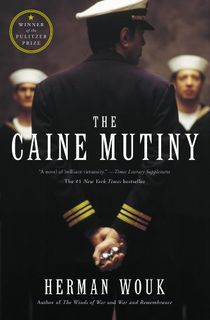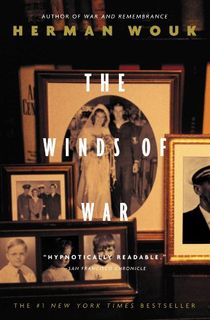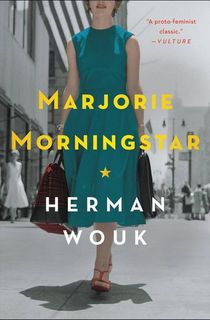Called “the reclusive dean of American historical novelists” by The Washington Post, Pulitzer Prize-winning author Herman Wouk penned his first book while serving aboard destroy minesweepers in the Pacific Theater of World War II. His most famous novel, The Caine Mutiny, which was published in 1951, also drew from his experiences onboard the USS Zane and the USS Southard during the Second World War.
The Caine Mutiny won the Pulitzer Prize and catapulted Wouk into a distinguished literary career that would last until his death in 2019, at the age of 103. In fact, Wouk’s longevity partially inspired a short story by Stephen King that was published in the May 2011 issue of The Atlantic, entitled “Herman Wouk Is Still Alive.”
Wouk wrote many more books than the one for which he is best known, however, as these 10 volumes amply demonstrate. From comedy to war to the history of the nation of Israel, these are some of the best and most important books by one of our most celebrated writers.

The Caine Mutiny: A Novel of World War II
Made into the movie of the same name in 1954, starring Humphrey Bogart, The Caine Mutiny was Herman Wouk’s first big success, and remains his most famous novel. Winner of the Pulitzer Prize, it was adapted to the Broadway stage by Wouk himself before being made into the Academy Award-nominated motion picture. Drawing from Wouk’s own experiences on board destroyer-class minesweepers during World War II, the novel explores the moral and ethical decisions made by officers on board ship through the lens of a nonviolent mutiny aboard the fictional USS Caine.

The Winds of War
Besides The Caine Mutiny, Wouk’s best-known books may be the two-part World War II saga that he published in the 1970s, beginning with The Winds of War. Mixing real and fictional characters, the two novels tell the story of World War II from beginning to end, with The Winds of War starting six months before Germany’s invasion of Poland and extending until the attack on Pearl Harbor in 1941.
Originally conceived as a single volume, Wouk broke the books into two when he realized how long the story was becoming, and has called the duology “the main tale I have to tell.”

War and Remembrance
Picking up where The Winds of War leaves off, War and Remembrance continues the story through the end of the war, including the Allied invasion at Normandy, the events of the Holocaust, and much more. Like its predecessor, War and Remembrance was adapted into a popular TV miniseries directed by Dan Curtis and starring Robert Mitchum.
Combining fictional narratives with real characters and meticulous historical research, Wouk sought to “bring the past to vivid life through the experiences, perceptions, and passions, of a few people caught in war’s maelstrom,” in his own words.

The Hope
Hailed by Publishers Weekly as “an engrossing and often moving tale,” The Hope is the first book in Herman Wouk’s two-part history of the state of Israel, covering elements from the Israeli Declaration of Independence in 1948 through the Six-Day War of 1967.
As he did with The Winds of War and War and Remembrance, Wouk interweaves meticulously researched history with fictionalized narratives of imaginary characters such as Zev Barak and Joseph Blumenthal, nicknamed “Don Kishote.” The sweeping historical epic was continued in Wouk’s 1994 follow-up, The Glory.

The Glory
As in The Hope before it, The Glory continues the saga of the history of Israel, engaging with important moments in history including the sinking of the Israeli ship Eilat, the Yom Kippur War, Operation Entebbe, the War of Attrition, and many more.
From the chronicles of the fictional families who make up the book’s cast of characters to the interior lives of real historical figures including Golda Meir, Yonatan Netanyahu, David Elazar, and many others, this far-reaching book continues the story begun in The Hope, and provides historical context for a conflict that unfortunately continues to this very day.

Inside, Outside
Wouk’s twelfth novel, published almost a decade before The Hope, prefigures several of the themes of that book. In Inside, Outside, Wouk writes a semi-autobiographical tale of a Russian Jewish writer who gets a job in a minor bureaucratic post in Nixon’s White House, a role which brings him into contact with many personages of historical significance including John Barrymore, Zero Mostel, Marlene Dietrich, Ernest Hemingway, Golda Meir, and others.
As the writer unveils his life story, he also travels to Israel during the Yom Kippur War, placing him squarely in the midst of unfolding history.

Don't Stop the Carnival
Though Herman Wouk is best known for his historical novels chronicling the events of World War II, he was a wide-ranging author who wrote on a number of subjects, not all of them so serious.
Don’t Stop the Carnival is his comedic, satirical tale of a New York City press agent who reinvents himself as a hotel keeper in the Caribbean, to disastrous results. Based on Wouk’s own experiences in Saint Thomas, this 1965 novel was later made into a musical and album by Jimmy Buffett.

The Will To Live On
In addition to his many novels, Herman Wouk also penned considerable nonfiction, especially celebrated works concerned with his Jewish heritage.
Writing with “great love of his tradition and with a becoming modesty about his own impressive scholarship,” Wouk’s The Will to Live On conveys “the large arc of 2,500 years of Jewish history and the grandeur of the Hebrew Bible and prophets, the ‘exalted challenge’ of studying the Talmud and the complex questions of identity facing Jews today, whether in Israel or in the Diaspora” (Publishers Weekly). The result, a companion piece to Wouk’s earlier nonfiction work, This is My God, has become one of the most beloved books on the subject of Jewish history and tradition.

Youngblood Hawke
Originally published in 1962 and partly inspired by the real-life story of literary legend Thomas Wolfe, this “tremendous novel, full of wisdom and pain” (Los Angeles Times) tells the story of Arthur Youngblood Hawke, a writer from rural Kentucky who becomes the toast of the New York literary scene, only to find himself over-extended as a result of his quest to accrue greater and greater wealth.
In 1964, it was adapted into a feature film by Warner Brothers, featuring James Franciscus in the title role, where he starred alongside the likes of Eva Gabor and Suzanne Pleshette.

Marjorie Morningstar
Wouk’s follow-up to The Caine Mutiny spent some 37 weeks atop the New York Times bestseller list, often in the top position. In his book about Wouk, Arnold Beichman noted that Marjorie Morningstar was “the first Jewish novel that was popular and successful, not merely to a Jewish audience but to a general one.”
Adapted into a 1958 movie of the same name starring Natalie Wood, Marjorie Morningstar chronicles the life of a Jewish girl in New York City who longs to become an actress, along with her successes, her failures, and her relationship with her Jewish heritage.



